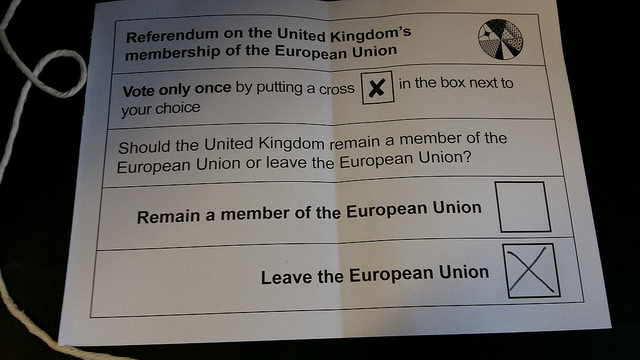Europe after Brexit
Posted By
Dominique Moisi
on June 28, 2016 @ 10:00

US President Franklin D. Roosevelt once proclaimed that ‘the only thing we have to fear is fear itself’. The United Kingdom’s ‘Brexit’ referendum, in which just over half of those who voted chose to leave the European Union, proved that he was not exactly right. We must also fear the people, like Britain’s populist leaders, who prey on public fears to bring about truly terrifying outcomes. In this case, the outcome may well lead to the EU’s disintegration.
After 43 years of EU membership, Britain has, in what is purportedly the most democratic manner possible, decided to retreat into itself. However pragmatic and realistic Britons supposedly are, they’ve voted against their own interests. By rejecting the EU, they’ve probably condemned their country to gradual impoverishment and, perhaps, to not-so-gradual disintegration, as the leaders of Scotland and Northern Ireland, which overwhelmingly voted to remain in the EU, have said they want out.
Indeed, what Britons should’ve been afraid of was Brexit. Yet reason, weakly defended by uninspired and untrusted establishment voices, couldn‘t stand up to fears of what might come through a door left open to the rest of Europe—and, indeed, the rest of the world.
The true paradox here is that it’s precisely when they’re saying ‘Non’ to Europe (echoing Charles de Gaulle’s famous veto of Britain’s first application to participate in European integration) that the British are the closest in emotional terms to the rest of Europe’s citizens. And, in fact, that may be the problem.
People are afraid all across Europe—indeed, all over the world. Above all, they fear globalisation, which, in their view, has brought the menacing ‘other’ into their daily lives and undermined their livelihoods, while benefiting only the elites. They are afraid for their security and their jobs—and they’re furious with the leaders who’ve failed to defend their interests.
The result is that the ‘have-nots’ are increasingly turning on the privileged elites, and thus on the openness that those elites favor, demanding instead a return to what they view as a more predictable and secure past. Nostalgia was a driving force behind the leave campaign, as was the desire to punish the scoundrels in charge.
The Brexit vote was no fluke, nor should it have been a surprise. It was the result of long-held fears and frustrations, though one might not have expected that, for many British, instinct would become a point of arrival rather than a point of departure. In any case, a few years ago, those instincts would not have taken the UK out of the EU. It was a grave political miscalculation that made this political tragedy possible.
One of the most important lessons of the Brexit campaign is that when politicians try to manipulate society’s emotions to their own ends, as Prime Minister David Cameron did, things can quickly get out of hand. Throwing gasoline on the flames of fear and frustration may have won Cameron and his party the 2015 election, but it also produced the conflagration that has gutted his party, his legacy, and his country.
The problem for the rest of Europe is that Brexit itself could serve as the accelerant for popular passions, with feckless populist figures happily fanning the flames. Even Donald Trump, the presumptive Republican nominee for US president, has expressed his support for Brexit; despite his cluelessness, he recognizes how powerful the promise of ‘taking one’s country back’ can be. And people like Trump don’t seem to worry much about consequences. These aren’t modern Winston Churchills.
The extent to which Europe will break down, and the consequences of that process, remain to be seen. But it’s reasonable to expect populists and independence movements in Europe and beyond to feel invigorated by the move. The image of Europe in seemingly terminal decline is sure to undermine its soft power.
With Europe’s role on the international stage under threat, its leaders must urgently undertake a massive self-assessment, both literally and metaphorically. They need to figure out what they have done—or not done—to lose the trust of their citizens and devise a plan, at the national and EU levels, to regain that trust.
Crucially, such an assessment must precede a push for greater integration. If the EU launches a panicked effort to lurch forward, it will prove its lack of understanding of what’s really happening.
June 23, 2016, will not go down in history as the UK’s independence day, as Boris Johnson, London’s former mayor and a leader of the Leave campaign, promised. But it could be remembered as the day when Europe finally woke up, realising that, to secure its future, its only option is to commit to reinventing itself.
Dominique Moisi is a professor at L’Institut d’études politiques de Paris (Sciences Po), a Senior Adviser at the French Institute for International Affairs (IFRI) and a visiting professor at King’s College London. This article is presented in partnership with Project Syndicate © 2016.
Article printed from The Strategist: https://www.aspistrategist.org.au
URL to article: https://www.aspistrategist.org.au/europe-after-brexit/
[1] proclaimed: https://www.youtube.com/watch?v=nHFTtz3uucY
[2] EU’s disintegration: https://www.project-syndicate.org/commentary/european-union-after-brexit-by-slawomir-sierakowski-2016-06
[3] grave political miscalculation: https://www.project-syndicate.org/commentary/eu-referendum-will-determine-cameron-legacy-by-mark-leonard-2016-01
[4] invigorated by the move: https://www.project-syndicate.org/commentary/brexit-direct-democracy-destroys-europe-by-mark-leonard-2016-06
 Print This Post
Print This Post